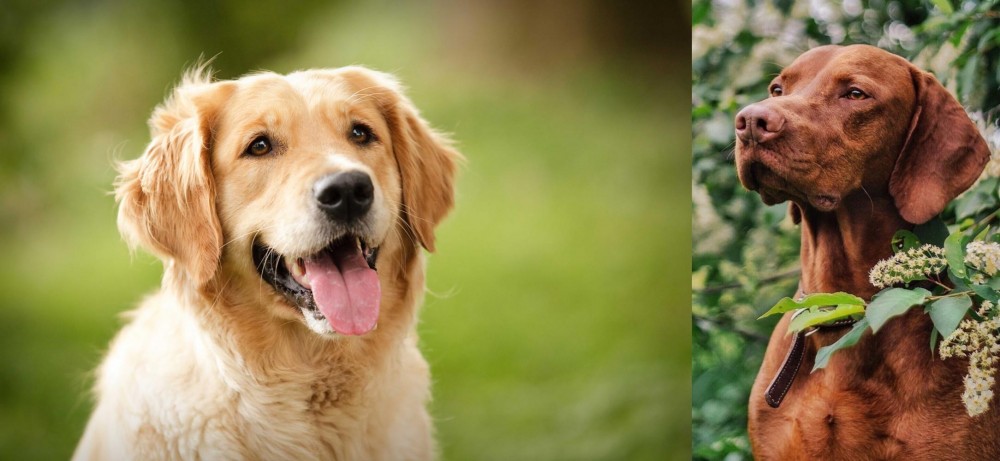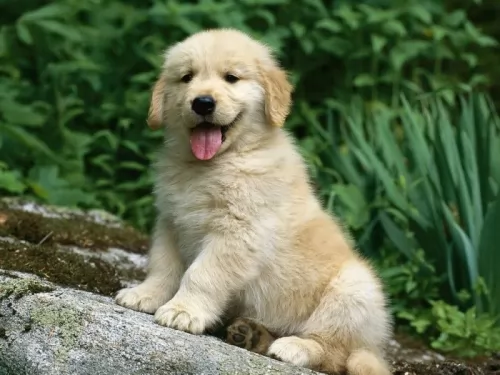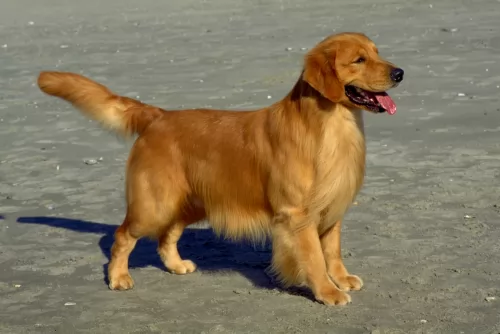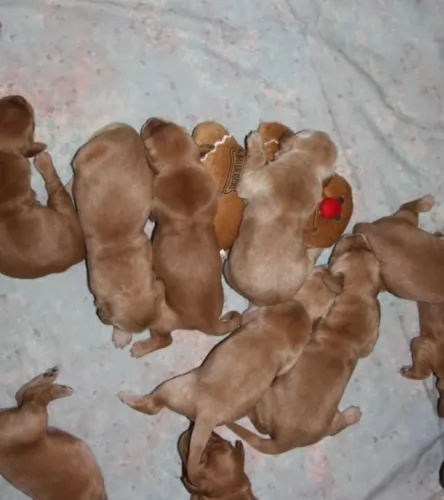 Petzlover
Petzlover Golden Retriever is originated from United Kingdom but Vizsla is originated from Hungary. Golden Retriever may grow 33 cm / 13 inches higher than Vizsla. Golden Retriever may weigh 6 kg / 14 pounds more than Vizsla. Both Golden Retriever and Vizsla has almost same life span. Golden Retriever may have more litter size than Vizsla. Golden Retriever requires Moderate Maintenance. But Vizsla requires Low Maintenance
Golden Retriever is originated from United Kingdom but Vizsla is originated from Hungary. Golden Retriever may grow 33 cm / 13 inches higher than Vizsla. Golden Retriever may weigh 6 kg / 14 pounds more than Vizsla. Both Golden Retriever and Vizsla has almost same life span. Golden Retriever may have more litter size than Vizsla. Golden Retriever requires Moderate Maintenance. But Vizsla requires Low Maintenance
 The Hungarian Vizsla or Magyar Vizsla is a hunting dog developed in Hungry. It is the smallest of the pointer-retriever type breeds. They are loyal family dogs and hunt fowl and upland game. It was rare for a hunting dog to also be a companion and family dog, but the Vizsla is. The first time the Vizsla came to the attention of anyone outside its area was 1357 in a publication written for King Louis I of Hungary. They were kept mostly by barons and warlords and preserved without any interbreeding for centuries.
The Hungarian Vizsla or Magyar Vizsla is a hunting dog developed in Hungry. It is the smallest of the pointer-retriever type breeds. They are loyal family dogs and hunt fowl and upland game. It was rare for a hunting dog to also be a companion and family dog, but the Vizsla is. The first time the Vizsla came to the attention of anyone outside its area was 1357 in a publication written for King Louis I of Hungary. They were kept mostly by barons and warlords and preserved without any interbreeding for centuries.
Through all the occupations, revolutions and world wars, the Vizsla survived. Still there were some points in their history where they were almost extinct. In the 1800’s English Pointers and German Shorthaired Pointers almost replaced them. After World War II they were almost extinct again with only a dozen or so left in the country.
Breeders across Hungry brought them back again. They were also bred in Serbia, Slovakia, Austria and Romania. They came to the states after the war and quickly were embraced. The Vizsla Club of America was formed so that they could be recognized by the American Kennel Club. This happened in 1960 and the Vizsla quickly became a champion in several AKC specialties.
The Weimaraner, the German Shorthaired Pointers, the Wirehaired Vizsla and other pointers were developed from the Vizsla and then used to re-establish the breed following World War II.
 The Golden retriever always gets in the top ten ranking in USA. They are very intelligent and beautiful. Also they are very active and they take more years to mature as they like being silly and playful. Up-to four years they seem to play like a puppy. As the breed is set in for hunting waterfowl and ducks, they need a regular exercise such as walking or running. They love to roam in the yard and run in the beach.
The Golden retriever always gets in the top ten ranking in USA. They are very intelligent and beautiful. Also they are very active and they take more years to mature as they like being silly and playful. Up-to four years they seem to play like a puppy. As the breed is set in for hunting waterfowl and ducks, they need a regular exercise such as walking or running. They love to roam in the yard and run in the beach.
They love to be always with his master and so it will be inside the home. They can be involved in doing regular home activities. Their characteristic is not to be a watchdog, as it barks when a stranger comes and after that they love to make friendship with him. They don't like to spend time alone and hence love to make new friends. When you think of buying a golden retriever puppy you should check whether the breeder is a reputable breeder.They must be well trained for a good result. When bringing it to many different areas they will gain more knowledge and intelligence. The nails can be trimmed at a regular interval which will be good for the foot of your dog.
 The golden/rust colored Vizsla is easily distinguished from other breed. They are a medium sixed pointer with a lean frame and light on their feet. They have long ears that are silky to the touch and well defined muscular structure. Their nose is a red color blending in with their coat color. Their eyes and nails also blend in with the color of the coat.
The golden/rust colored Vizsla is easily distinguished from other breed. They are a medium sixed pointer with a lean frame and light on their feet. They have long ears that are silky to the touch and well defined muscular structure. Their nose is a red color blending in with their coat color. Their eyes and nails also blend in with the color of the coat.
For the most part they are some shade of golden-rust, but today there are also some solid rust dogs as well. Officially the coat can be russet gold, copper-brown, or dark sandy gold. It cannot be mahogany red or pale yellow. The coat is dense, smooth, short and without an undercoat. They have docked tails as well.
 They love so much to play and spend time with children.
They love so much to play and spend time with children.
The Golden retriever has a good energy which helps them to be a great hunting dog.
They have a high sensitivity level and will enjoy moderate weather. They don't like apartment life as they love to roam freely and explore new areas.
They also have a high intelligence and so learns tricks very quickly. They love to hold something in mouth and run.
 As the golden retriever gains weight very easily, they should not be overfed. They are prone to get cancer, hip dysplasia, heart problems, eye defects and skin allergies.
As the golden retriever gains weight very easily, they should not be overfed. They are prone to get cancer, hip dysplasia, heart problems, eye defects and skin allergies.
The golden retriever sheds hair profusely. The shedding can be reduced by brushing 3 times a week as it will remove the dead hair.Mild shampoo containing omega 3 and omega 6 fatty acids must be used so that it will prevent hair fall and provides healthy skin and fur. The hair can be trimmed but it should not be shaved as the pet will get problems during winter. Adding a drop of olive oil in the dog food will reduce shedding.
 The Vizsla have few health issues but the ones they do have are quite serious. They include:
The Vizsla have few health issues but the ones they do have are quite serious. They include:
• Cancer (Mast cell, Lymphoma and Hemangiosarcoma) – as will most dogs it can be treated but is still likely to kill the dog.
• Hip dysplasia is rare, but cases have been noted. Can cause lameness and/or arthritis.
• Sebaceous adenitis – rare skin disease found more often in cats or birds than in dogs.
 The puppy should be fed 3 times a day and it should be morning 7 and noon and evening within 6. They should not be fed after 6pm and should not be given water after 7pm as to make them a perfect watchdog. Peas, potatoes and flaxseed provide nutrition for them. Chicken fat is good for their skin. Chicory root and chelated minerals are good for their health.
The puppy should be fed 3 times a day and it should be morning 7 and noon and evening within 6. They should not be fed after 6pm and should not be given water after 7pm as to make them a perfect watchdog. Peas, potatoes and flaxseed provide nutrition for them. Chicken fat is good for their skin. Chicory root and chelated minerals are good for their health.
The Golden retriever can be fed by normal nutritious and proteins content food as they will gain much energy for them.
As the golden retriever has chances of getting bone problems they should not overfed.
They are having high energy levels and hence they require playing for 2 hours daily. The breed was set in for sporting and hunting and so it likes to play, run and jog.
 Feeding the puppy This is a very active dog and he need a high calorie diet as a puppy. Feed 4-5 cups in 3-4 smaller meals per day.
Feeding the puppy This is a very active dog and he need a high calorie diet as a puppy. Feed 4-5 cups in 3-4 smaller meals per day.
2.Feeding the adult Feed the adult high calorie food if you exercise her enough. Feed 3 cups of food twice a day.
4. Exercise They love to run but don’t’ overdo it until they are at least 18 to 24 months old. They stay very playful their entire lives and excel at AKC competitions. They are good at agility, field trials, scent work, obedience, conformation, dock diving, rally, lure coursing, track and barn hunt.